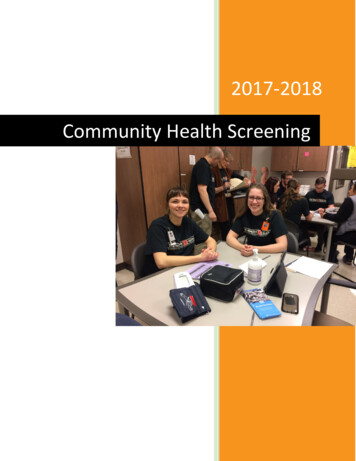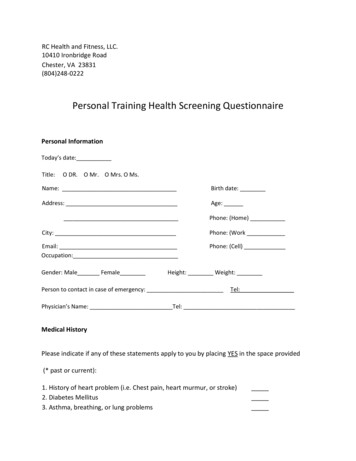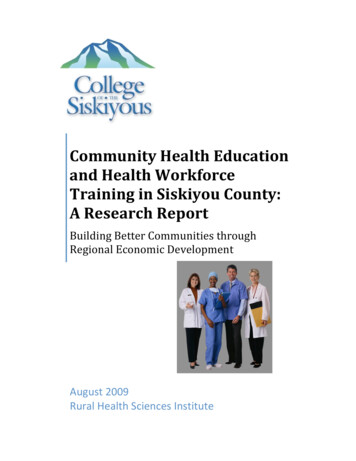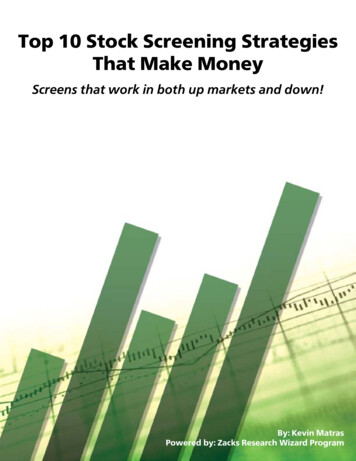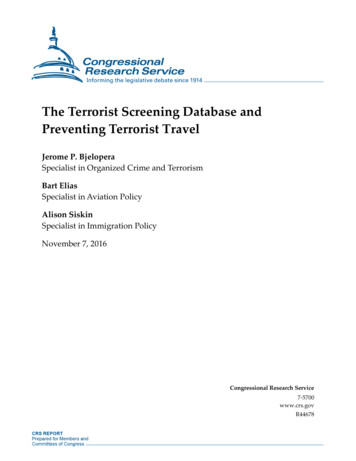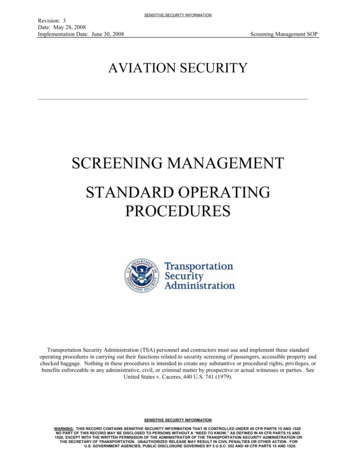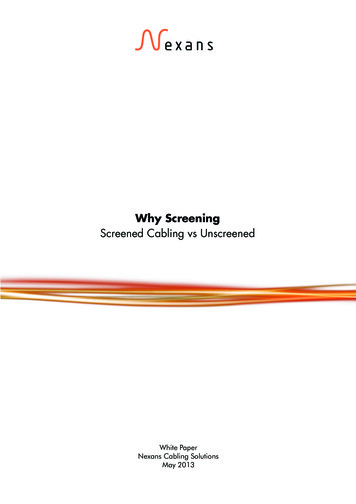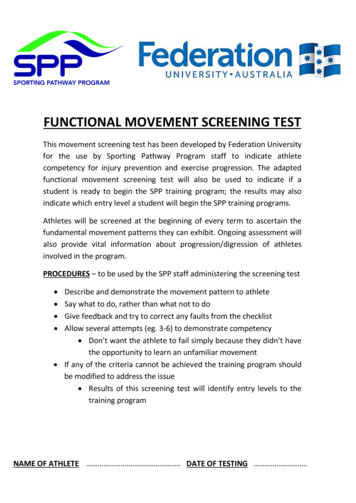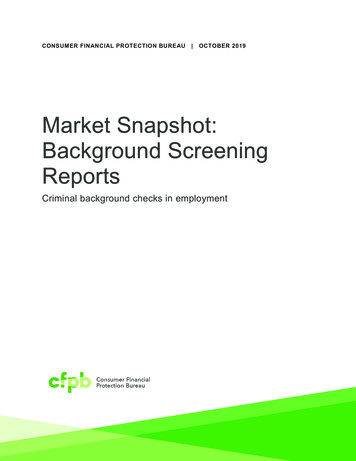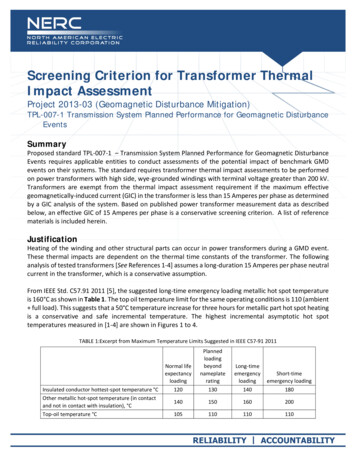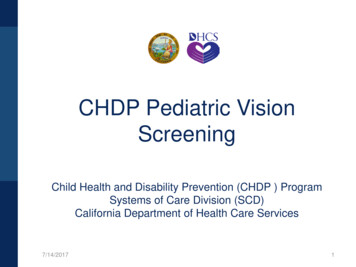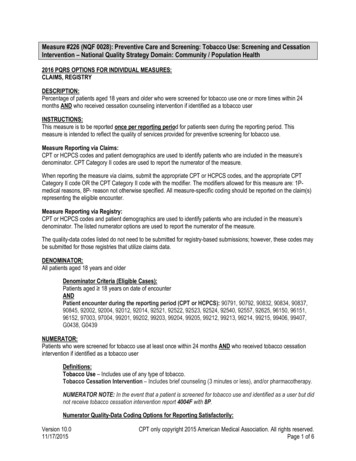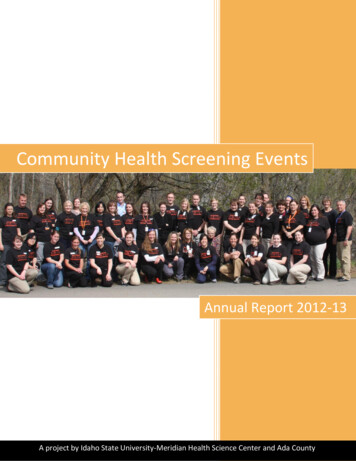
Transcription
Community Health Screening EventsAnnual Report 2012-13A project by Idaho State University-Meridian Health Science Center and Ada County
Community Health Screening EventsBackground 1 oneThe concept of the Community HealthScreening (CHS) events began inJanuary 2010 between Idaho StateUniversity-Meridian Health ScienceCenter (ISU-Meridian HSC) and AdaCounty because of the county’s needto reduce costs to taxpayers byproviding better access to medicalcare for the growing indigentpopulation. Ada County believed thatby establishing ongoing preventivemedical treatment, a reduction inemergency room visits for criticalmedical needs would be realized, translating into cost savings for county and state taxpayers. ISUMeridian HSC faculty saw this as an opportunity to lead by example and assist the community, all thewhile developing an innovative health experience for learners in an interdisciplinary environment.ISU Involvement 2 twoFaculty InvolvementDuring the 2012-2013 screening season, ISU faculty and staff donated many hours to the success of thisproject. Between 500 to 600 hours in preparation and execution of the screenings was logged byfaculty, not including administration and staff time. Each health discipline involved with the CHS hadone faculty member devoted to this project. In total, nine core faculty members participated in additionto the two co-directors who also represented their own disciplines (pharmacy and public health).Preparation hours included scheduling times and locations for the six annual screenings, coordinatingfaculty and student schedules with availability of locations, and planning meetings to discuss possiblechanges and staff requirements for the various locations. Time was also spent in obtaining donatedvaccines that could be provided at the screenings. On the day of the screening event, a minimum offour to six hours of faculty time and a minimum of eight hours for the two co-directors were logged.The majority of faculty time at the screening events was spent in direct supervision of student activities,serving as a resource for student and participant questions, and in maintaining event flow. These facultyactivities were in addition to academic and clinical workload in most departments.Administrative staff at ISU-Meridian HSC assisted with public relations activities by advertising on theelectronic sign outside of ISU-Meridian HSC and Renaissance High School and by providing press releasesto various newspapers, radio and television stations announcing upcoming events. On the days prior toscreening events, the staff also fielded calls from the community to answer any relevant questions.Annual Report 2012-13Page 1
Community Health Screening EventsStudent InvolvementStudent participation is imperative in order foreach and every screening event to function.During the 2012-2013 academic year, studentinvolvement was expanded. In order toexpand the number of screening stations,departments were asked to have 4-5 studentsvolunteer at each event as opposed to the 2-3students expected during previous years. Inaddition, the Nursing Practice and PublicHealth departments were also incorporatedinto the screening process joining at the10/4/12 and 11/1/12 screenings respectively.This year 139 students assisted with at least one screening, and 61 of those students attended multipletimes. On average at each event, 39 students from ISU-Meridian HSC were directly involved withscreening participants. This totals approximately 950 hours of donated student time.Career Path InternsThis school year, an additional Career Path Intern (CPI) was added to the CHS team. The two CPIs, one apharmacy doctoral student and the other a master of public health student, contributed up to 20 paidhours a week each to the CHS during the regular academic year. Their responsibilities includedassembling CHS documentation files and other organizational duties prior to the screenings. Betweenscreening events, the CPIs entered all collected data and assisted with data analysis. During the actualevents, they managed the check-in station and assisted participants in completing the initial paperwork.Department InvolvementFor a complete list of academic programs offered at ISU-Meridian HSC explore the following Accelerated NursingThe Accelerated Nursing program in the School of Nursing Undergraduate Studies is located at the ISUMeridian HSC campus. This program is eligible to students who have a Bachelor of Science degree inanother discipline. Approximately 30 students are admitted to the Accelerated Program annually andspend four semesters earning their degree. There are clinical faculty members located on the ISUMeridian HSC campus.Communication Science & Disorders/Speech Language Pathology/AudiologyThe Department of Communication Sciences and Disorders (CSED) offers Bachelor’s and Master’sdegrees in Speech-Language Pathology (SLP), Bachelors and Doctoral degrees in Audiology, Associate’sdegrees in Sign Language Studies, and Bachelor’s degrees in Sign Language Interpreting. Students whoare in the speech-language pathology Master of Science program complete two years of study at eitherthe Pocatello or Meridian campus or online. Students who are in the Doctor of Audiology programAnnual Report 2012-13Page 2
Community Health Screening Eventscomplete two years in Pocatello, a thirdyear of didactic program in Meridian, and afourth year in a field experience. Onaverage, 8 audiology students and 54speech pathology students enter thegraduate programs each year. In addition,40 speech-language pathology/audiologyjuniors enter the undergraduate programyearly in Pocatello and Meridian. Currently,115 students are located on the Meridiancampus as well as five clinical faculty andthree speech-language pathology researchfaculty, one educational interpreter faculty, and one audiology research faculty.CounselingThe Department of Counseling offers accredited master's degrees in Marital, Couple, and FamilyCounseling, Mental Health Counseling, School Counseling, and Student Affairs Counseling. In addition,the Department of Counseling offers a Doctor of Philosophy (Ph.D.) degree in Counselor Education andCounseling. Approximately 100 students total are admitted to the various programs each fall, with 30master’s level students and 6 doctoral students at ISU-Meridian HSC. The ISU-Meridian HSC is also hometo two full time faculty members. It offers a sliding scale clinic for low-income individuals withcounseling needs.Dental ResidencyThe Idaho State University dental residency program trains eight licensed dentists per year, four ofwhom are located at the ISU-Meridian HSC. These dental residents gain valuable experience treatingindividuals at the 12 chair dental clinic located at the ISU-Meridian HSC. This is the only post-graduatetraining opportunity for dentists in the Treasure Valley. The residency program has two site directors aswell as many adjunct faculty members on site to provide supervision and expertise.Dietetic InternshipThe Dietetic Internship is open to students who have previously completed a bachelor’s degree in theDidactic Program in Dietetics. This program is a 33 week internship: 11 weeks in a clinical rotation, 8weeks in a food service management rotation, and 12 weeks in various community rotations. InMeridian a half-time clinical coordinator coordinates classroom activities, preceptors and facilities forthe 8 students enrolled at the Meridian site. Ten additional students are enrolled in Pocatello.HIV/Viral Hepatitis Education ProgramThrough a partnership with the University of Washington/Northwest AIDS Education and TrainingCenter (NW-AETC), ISU employs one program coordinator to provide statewide HIV and AIDS medicaltrainings. The program coordinator helps acquire free HIV and Hepatitis C test kits, trains students toperform the tests, and is available at the screenings to provide results to participants.Annual Report 2012-13Page 3
Community Health Screening EventsInstitute of Rural HealthThe Institute of Rural Health (IRH) is a university-based research, education, and service organizationproviding research, consultation, and technical assistance to governments and communities in thehealth field. The IRH is home of the Community Health Screening co-coordinator and the Career PathInterns.Medical Laboratory SciencesStudents can earn a degree as either a Bachelor or a Masterof Science degree in Medical Laboratory Science (MLS). Upto 20 students are admitted to ISU-Meridian HSC and up to20 Students are admitted to ISU Pocatello program each fall.The MLS Program has 3 full time clinical faculty, with onegeographically located in Meridian.Nursing PracticeThe Idaho State University School of Nursing offers the Master of Science in Nursing degree to prepareadvanced practice nurses as Family Nurse Practitioners and Clinical Nurse Specialists. Approximately 40students are admitted to the program each year, many of these students resided in the Treasure Valley.Beginning in the Fall of 2013, the Doctor of Nursing Practice degree will replace the Master of Science inNursing. Two full time faculty members are positioned at ISU-Meridian HSC.Public HealthIn the only nationally accredited Master of Public Health program in the state, students acquirenecessary public health knowledge and skills in epidemiology, biostatistics, health care ethics, healthorganization and policy, health program planning and evaluation, health education promotion, researchmethodology, and environmental health. The MPH program employs two full time faculty on thePocatello campus only and is currently recruiting a faculty member at the ISU-Meridian HSC.PharmacyThe College of Pharmacy is the only accredited pharmacy school in the state of Idaho. Students enrolledin the 4 year professional doctorate program focus on improving clinical outcomes and the quality of lifefor patients. The College of Pharmacy admits 70-80 students each year, 35 students complete theircoursework at the ISU-Meridian HSC. Four basic science faculty and nine clinical faculty, one of which isthe CHS co-director, are housed in ISU-Meridian HSC.Physician Assistant StudiesThe Physician Assistant (PA) Program admits 60 students a year, 30 students located at the Pocatellocampus and 30 in Meridian, to obtain a Master of Science degree. The ISU PA program is focused onmeeting the health care needs of Idaho by educating compassionate primary care providers who willserve individuals and their communities. There are five full time faculty at ISU-Meridian HSC campus.Annual Report 2012-13Page 4
Community Health Screening EventsTable 1: Number of Students Involved by Department and Event Date10/4/12 11/1/12 12/6/12 2/7/13Accelerated NursingCSED/SLP/AudiologyCounselingDental ResidencyDietetic InternshipMedical Laboratory SciencesNursing PracticePublic HealthPharmacyPhysician epartment involvement varies screening to screening due to curricular and scheduling challenges. Forinstance, PA students are required to be in class until 5pm, therefore other departments may need toprovide additional students to cover until PA students arrive. At other times of the year, departmentsmay not be able to attend due to conferences or other scheduling conflicts. In addition, the ISU DentalResidency Clinic provides routine clinic services during screening times; therefore, they are only able tosend two residents, as well as two dental hygienists, in order to maintain necessary coverage in bothlocations.Community Partners 3 threeAda CountyAda County is the original community partner providing financial and community support sinceinception of the CHS. Their financial support has helped the CHS acquire needed supplies; however thisis just a small part of the County’s involvement. They have also provided staff to assist with advertisingfor the screening events through various media outlets. Ada County has served as a team builder byuniting government and non-government entities with a stake in health care. In true partnership, AdaCounty and ISU-Meridian HSC have worked together to enlist and encourage clinicians in the communityto continue health care initiated at the screening events. This follow-up is crucial to preventcatastrophic health care situations and to provide care for the health threats identified at the screeningsfrom escalating to a critical need that requires a costly emergency room visit.Department of Health and WelfareSince early on in the inception of this project, it was important to be inclusive of all organizationsinvolved in health and wellness. The Department of Health and Welfare (DHW) became an early partnerand continued to be a critical part of the 2012-2013 screening events. With the top down investmentfrom the Regional Director for Southwest Idaho, the DHW has been an active partner by assisting inAnnual Report 2012-13Page 5
Community Health Screening Eventslocating and securing sites for the screenings and acquiring flu vaccine, while remaining a great moralsupporter of the team.Central District HealthCentral District Health provided personnel at the screenings to distribute medical health information.They also assisted in the distribution of flyers for the events throughout their various programs.Community Medical PartnersThe following Community Medical Partners provide allocated appointment slots for the screening eventswhich are distributed to participants most in need of routine medical care:Garden City Community Clinic, a free clinic for those who qualify, also provided personnel at thescreening events to be a warm hand-off to their clinic, as well as to triage participants to help determinewho receives the allocated appointment times.Unity Health Clinic, who offers a sliding scale option, provided the medical director for the laboratorytesting, was responsible for the CLIA waiver, and maintained the CHS vaccine supply.Family Medicine Residency of Idaho (FMRI), a community health center look-a-like with a slidingfee scale, provided personnel at some screening events to help participants understand financialeligibility requirements that needed to be met prior to receiving services from FMRI.Terry Reilly Medical-Boise is a federally qualified community health center providing sliding fee scaleoptions for those without insurance and free medical care to the homeless population.Friendship Clinic is a small, free neighborhood medical clinic.Other PartnersInstitute of Translational Health Science provided secure, online storage of CHS data through niversityofWashington.The Screening Process 4 fourThe screening process was designed for participants to start at the beginning and continue through eachstation in a consecutive manner. Many of the stations depend on data collected at previous stations inorder to complete the necessary screening. Skipping from one station to another decreases theefficiency of the screening process, although participants were allowed to decline any screening station,assessments or tests. In planning the stations, it was intended that participants would spend about 10minutes at each station before moving on with the exception of the physical exam station, which takesabout 20 minutes to complete. Once participants started at the first health screening station aftercheck-in, it was expected that the remainder of the process would take about 100 minutes to complete.When the CHS events incurred a high volume of participants at the opening of the screening, asubstantial wait time usually occurred between checking in and starting the first screening station. A listof stations, screening and assessments offered, disciplines involved, and the approximate time it took toAnnual Report 2012-13Page 6
Community Health Screening Eventscomplete each specific station can be found in Table 2. Participants could arrive for the screeningevents anytime between 4 and 7 pm. Students and faculty were on location at 3pm to set up and oftenfinished cleaning up around 9 pm depending on the number of participants present at the screeningevent.The screening process has evolved since the inception of the CHS events. Initially, each discipline wasresponsible for one station. During the 2012-2013 academic year, the goal of the screenings was to mixdifferent disciplines as much as possible while ensuring that the students were still working within theirscope of practice. For example, a clinician student was added to the laboratory station to immediatelyinterpret the results, so participants did not have to wait for the next station to receive an explanationof their test. For the physical exam station, teams of three were created consisting of students from thefollowing disciplines: accelerated nursing,nursing practice, pharmacy and physicianassistant. Students then screened theparticipants as a team.This teamapproach was beneficial as it increasedcommunication between disciplines andbuilt trusting relationships as studentswith one skill set were able to rely oncolleagues with a different backgroundto assist them. The CHS planning teamcontinually looks for ways to integratestudent learning and practice using aninterdisciplinary approach.The check-in station had two processes. When participants initially arrived, they signed in and weregiven paperwork such as screening forms and a liability release to complete before they started thehealth screening stations. Career Path Interns (CPIs) or public health students provided an explanationof the forms and were available to assist participants with the paperwork when necessary. Once theintake paperwork was complete, the participants were then able to begin the screening process.Participants carried their paperwork from station to station. At each station, students recorded theirfindings on the documentation tool. The documentation tool was created in a way to make theinformation collected easily understood by both participants and their future medical providers.Students reviewed their findings of the screening or assessment with the supervising faculty member ofthat station; both needed to sign the form before the participant could move to the next station. Asstudents were working in teams with multiple health disciplines, it was possible that the supervisingfaculty was a member of a different discipline working under the same scope of practice. If amedical/mental/dental health issue was identified, it was up to the supervising faculty member todetermine the urgency of the issue and if a referral was indicated.Annual Report 2012-13Page 7
Community Health Screening EventsTable 2: Screening sks-Initiate paperwork including a liabilityrelease and demographics form-Complete forms reviewed later in theprocess including: hepatitis C risk, nutritionscreening, depression screening, drug andalcohol screening-Height, weight, BMI assessment-Nutrition assessment using 24 hourcomplete food and beverage recall-Patient-Generated Subjective GlobalAssessment (PG-SGA) for malnutrition-Evaluate teeth and gum health-Check for signs of oral cancer-HIV screen (if participant consents)-Glucose and total cholesterol screen-Hepatitis C screenPhysical Exam-Check blood pressure, heart and lungsounds, and lower extremities-PHQ-9 and CAGE-AID review to screen fordepression and drug and/or alcoholdependency-Framingham Risk assessment to determinerisk of having a heart attack in next 10 years-Medication review of drug allergies,prescription medications taken, and overthe counter products used on a regular basisHearing Screening -Examine ear health and wax build-up-Audiology/hearing screeningViral Screen-Give HIV and hepatitis C test resultsReferralsMotivationalInterviewingCheck Out-Review screening document withparticipant-Give refer
Accelerated Nursing The Accelerated Nursing program in the School of Nursing Undergraduate Studies is located at the ISU-Meridian HSC campus. This program is eligible to students who have a Bachelor of Science degree in another discipline. Approximately 30 students are admitted to the Accelerated Program annually and
